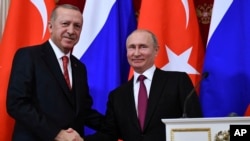Tensions appear to be surfacing between Russia and Turkey just hours into a three-way summit on the Syrian conflict being hosted in the Black Sea resort of Sochi.
According to Kremlin spokeswoman Maria Zakharova, Russia has told Turkey it lacked authorization to create a "safe zone" inside Syria without the express consent of Syrian President Bashar al-Assad.
"The question of the presence of a military contingent acting on the authority of a third country on the territory of a sovereign country, and especially Syria, must be decided directly by Damascus," she told reporters during a press conference. "That's our base position."
While Russia and Iran, whose president also is participating in the summit, are close allies of Syrian President Bashar al-Assad—Turkey, like the United States, which already is beginning to withdraw equipment from the country as part of a recently announced troop withdrawal—supports differing Syrian rebel factions.
Turkish President Tayyip Erdogan has long insisted that Syria's territorial integrity will be compromised so long as U.S.-backed Syrian Kurdish YPG militants, whom Ankara considers terrorists, remain in the area.
All three countries have made efforts to coordinate military forces on the ground, but contradictory military objectives—and competition for natural resources in Syria's oil-rich northern regions, has created friction between Moscow and Ankara in particular.
President Donald Trump's surprise announcement of a U.S. troop withdrawal has been welcomed by Russia, Turkey, Iran and Syria, though the sudden shift has left Astana trio leaders unclear about how to reconfigure their objectives in the absence of U.S. forces.
Some high level U.S. officials have anticipated that diplomatic differences between Ankara and Moscow could undermine progress at the summit.
Russian Foreign Minister Sergey Lavrov said Thursday the three presidents would discuss the formation of a committee that would be tasked with drafting a postwar constitution for Syria.
Lavrov did not discuss whether Syrian officials would be involved in that process.
Pete Cobus is VOA's acting Moscow correspondent.








